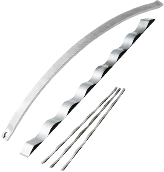- keyword
- SUS304
- SUS301
- SUS304-WPB
- springmaterials
- springdesign
- physicalproperties
- Young'smodulus
- tensilestrength
- density
- yieldstrength
- SNcurve
- SUS631
- stressstraincurve
- SUS631J1-WPC
- possonsratio
- expansioncoefficient
Question Spring Newbie 2007/1/11(Thu) 18:42
I’m writing for the first time. When I was looking at the previous posts in this forum, I found an excellent answer to the inquiry about the physical property values of the material, and I have a question for you. I searched JIS and on the Internet for the actual value of stainless steel strips and steel wires for springs to use for CAE and design calculations, but in the case of steel strips, I can only find the lower limit value. Regarding the following materials and physical property values, can you provide me the actual values measured by your company or from the catalogs/technical data of the material manufacturer? (Contact information will be provided at a later date after receiving an answer.)
SUS301-CSP (1 / 2H, 3 / 4H, H)
SUS304-CSP (1 / 2H, 3 / 4H, H)
SUS631-CSP (1) / 2H, 3 / 4H, H)
SUS304-WPB (Φ0.7-2)
SUS631J1-WPC (Φ0.7-2)
(Density; Tensile strength; 0.2% Yield strength; Young’s modulus; Poisson’s ratio; Expansion coefficient; Stress-Strain diagram; SN diagram)
Answer Tokai Spring 2007/1/13(Sat) 11:58
Thank you for writing to us!
Unfortunately, there is no manufacturer’s catalog technical data that describes the measured values of physical properties of the materials, or back data at our company. Generally, in spring design, the lower limit of mechanical properties is used, and the measured value for each lot is not adopted. In addition, mechanical properties such as tensile strength, hardness, and elongation are described in the test report (mill sheet) at the time of material purchase, so this can be submitted when the spring is delivered.
We are happy to answer any inquiries regarding technology, specifications, materials, etc. Please feel free to ask.

















